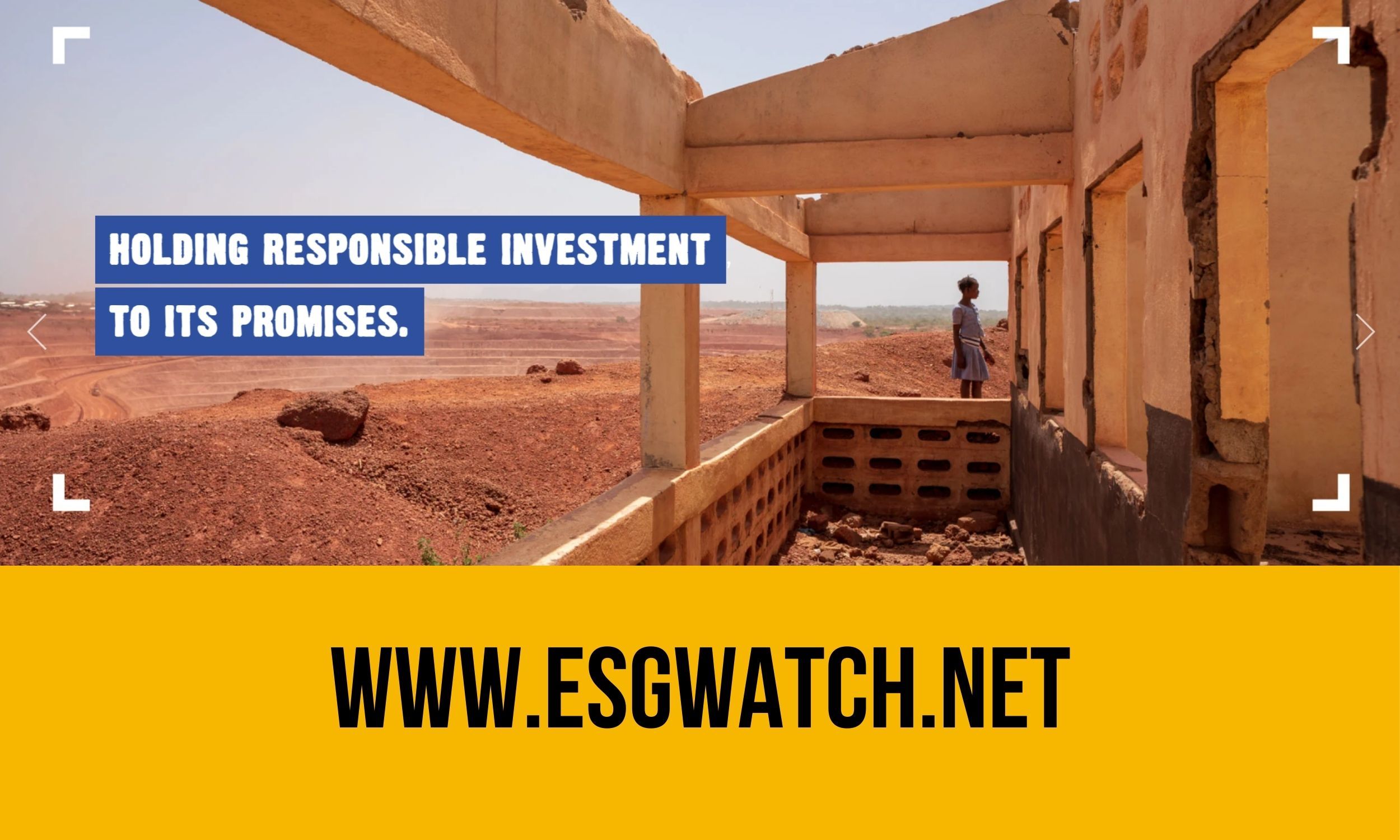Introducing ESG Watch: Holding “responsible” investment to its promises
Inclusive Development International’s new ESG Watch website and company database illustrates how ESG investment routinely flows to companies linked to human rights abuses.
Today, Inclusive Development International launched ESG Watch – a company database and website that tracks over $39 billion in environmental, social and governance (ESG)-focused investment flowing to companies that are linked to serious social and environmental harm. ESG Watch provides a platform to amplify the voices of communities affected by harmful corporate activities, publicize evidence of harm and hold financial services firms and investors accountable for fulfilling their human rights responsibilities.
Companies found to be benefiting from this “ESG-washing” include fossil fuel and mining giants facing numerous human rights complaints, weapons manufacturers implicated in war crimes, and over a dozen companies that maintain business ties to Myanmar’s military despite its well-documented commission of genocide and crimes against humanity.
“Any company that maintains commercial or business ties with the junta are ultimately complicit in the crimes and violations committed against the Burmese population in Myanmar,” said Mike, a human rights defender with the Blood Money Campaign, who uses a pseudonym for security reasons. “None of these companies should be rewarded with the financial and reputational benefits that come with high ESG ratings and investments by ‘responsible’ investors.”
All financial firms and investors have a responsibility to avoid contributing to human rights abuses through their investment products, but especially those that describe and market their products as environmentally and socially responsible options. When these firms find themselves linked to human rights abuses through their products, they have a responsibility to use their leverage to address the harms. The ESG Watch website explains why so many ESG investment products fall short and who is responsible, including the role of passive investing approaches that rely on ESG-labeled investment indexes that are created and marketed by MSCI, FTSE Russell, S&P Dow Jones Indices and others.
We created ESG Watch to call these actors out and demonstrate the need for reform, because if they lived up to their promises to the investing public, they could be a powerful force to incentivize responsible business conduct. Exposing ESG-washing and publicizing the environmental, social and human rights impacts of corporations is particularly important at this time, as the European Commission is rolling back its proposed mandatory human rights due diligence and sustainability reporting directives and the new U.S. administration is dismantling climate disclosure and other environmental regulations.
“The ESG investing industry needs to be held accountable to its human rights responsibilities, even as the very notion of responsible investing is under attack from the political right,” said David Pred, Inclusive Development International’s executive director. “Some asset managers may be retreating from ‘ESG’ labeling and rhetoric amidst these attacks, but they will continue to cater to the significant consumer demand for responsible investing options, which isn’t going anywhere. We cannot let that demand be coopted by false solutions—no matter how they are labeled.”
When misapplied, the ESG label can do more harm than good
When companies involved in human rights abuses benefit from ESG-focused investment, it not only betrays would-be ethical investors by directing their investments to unethical companies, it also poses a huge barrier for advocates and affected communities seeking remedy and accountability for those abuses.
“Harmful companies cite high ESG scores or their inclusion in ESG investment indexes and funds as proof of their good human rights and environmental practices all the time,” said Inclusive Development International’s senior legal & policy associate Coleen Scott. “The ESG stamp of approval makes it harder to convince shareholders, lenders and other key stakeholders that the company needs to change.”
We invite fellow advocates and affected communities to contribute to the database.
The 28 companies currently included in the database—all of which Inclusive Development International and our partners are familiar with through ongoing advocacy and case work—represent a fraction of the harmful companies that are benefitting from ESG investment. We will be working with civil society partners and affected communities around the world to add new companies to the database on an ongoing basis, and to hold them and the ESG investment industry accountable. Visit the contribute page to learn more.
The ESG Watch company database reveals the extent of ESG investment going to a number of notoriously harmful corporations.
Each company profile in the ESG Watch database presents evidence of the company’s human rights and environmental abuses alongside a tally of ESG-labeled funds that own shares in it, and the value of those shares. For example:
- TotalEnergies, a top contributor to global carbon emissions that is linked to numerous human rights controversies, including related to its East African Crude Oil Pipeline, benefits from over $1.6 billion in ESG investment.
- Rio Tinto, one of the world’s largest mining companies and the subject of numerous human rights and environmental complaints, benefits from over $480 million in ESG investment.
- Heidelberg Materials, a cement manufacturer accused of developing mines and factories over the objections of local and Indigenous communities in multiple locations, benefits from over $300 million in ESG investment.
- Elbit Systems, a defense firm accused of selling drones and drone parts to the Myanmar military, benefits from over $26 million in ESG investment. In total, 16 companies with business ties to Myanmar’s military are benefitting from over $36 billion in ESG investment, according to ESG Watch.
